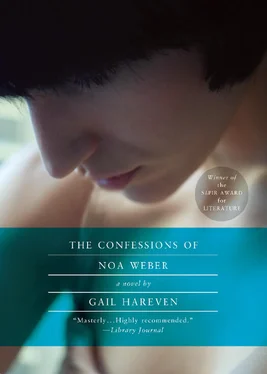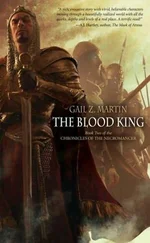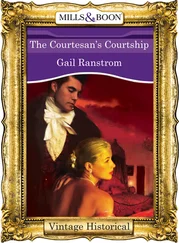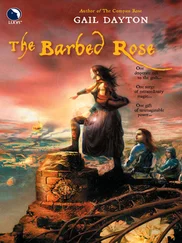On several occasions he lay in wait for me outside the house. And once he popped up in the rain and barred my way. “So this is what you want, so this is how you like it,” he hissed at me as he pushed me against the fence. His hair was wet, his face was wet, and his teeth were clenched over me. My pregnancy was already showing and my five-month belly was crushed against the trousers of his uniform. He had received a twenty-four-hour pass on the pretext of needing to have a wisdom tooth extracted, and after the tooth which didn’t need to be extracted at all had been extracted, straight from the dental clinic, with half his jaw still numb, he came to wait for me in the street. I learned all this later, from another letter he wrote me, and this too did not touch me.
I don’t want to think about him. He’s not my fault, and it’s not my fault that his expression looked ridiculous to me. As ridiculous as the way he grabbed my hands and held them behind my back, as if he was copying some manly gesture he’d seen in the movies, only the imitation was too transparent, like an actor in a bad audition. I shook him off without any difficulty. Without any difficulty because at this point I had nothing to offer in any case and nothing to give. Not to Amikam or to anyone else who wasn’t Alek.
FRAGMENTS
He asked: “Are you expected at home? Should I take you home now?” And I said: “There’s no need, I’m allowed to stay over, I’ve got my final exams in literature tomorrow.” He was amused by the literature exam. “What are you being examined on?” “Tons of stuff. The poets of medieval Spain, Tchernikhowsky, Bialik, Leah Goldberg, Amir Gilboa, five Agnon stories, Pere Goriot(??), Crime and Punishment , and that’s not all. I like Crime and Punishment best, in my opinion it’s the most profound, except for the character of Sonia which isn’t very convincing.” This amused him even more. I didn’t yet know that Alek was studying Comparative Literature. “Interesting … why don’t you find Sonia convincing?”
“Because she’s too one-dimensional, too saintly, as if she isn’t a prostitute at all. It’s obvious that no such prostitute exists.”
“You mean that Dostoevsky failed with her from point of view of social realism?’ ”
“I mean that a prostitute can’t be a saint.”
“And you know this, that a prostitute can’t be saint,” he stated, without a question mark. I didn’t know what to say to him, and I simply repeated like a literature teacher that Sonia was “a one-dimensional character, much more one-dimensional that Raskolnikov.”
He pulled on a pair of pants and got up to make us tea. I remained naked. “If you have an exam tomorrow, you must sleep,” he said and pulled the sheet up to my chin.
How did I come by the illusion that I “understood him,” having only the vaguest notion of what he was talking about?
“Only someone with an individual voice of his own can describe what is impossible to describe,” he quoted to me once, I don’t know from where.
Alek turned off the reading lamp and went to his cubbyhole of a study, the little room where I am writing now. In the light coming from his room and the light of the street lamp coming from outside, I could still see things, and everything I saw gave rise in me to a feeling of wonder, as if something very wonderful and joyful were dancing and twinkling in all the objects in the world. As if something beyond comprehension and steeped in magic pervaded everything, and I had only just found out. An old wooden cupboard, a mirror in a wooden frame hanging on the wall, a picture of a pale green demon woman reflected in the mirror, the bamboo armchair with a white bedspread thrown onto it. And a chilly breeze sharpening the edges of my body, the touch of the sheet and the configuration of the cascading fabric on the armchair.
Wide awake, more wide awake than I had ever been in my life, I sensed everything with my gaze, and it seemed to me that my eyes could feel textures: the lingering touch of a fold of pale cloth; the dry touch of a pile of books; the hooked green touch of the she-devil’s fingernails; the cold green touch of her figure in the mirror and the curly cold green of her hair. Below her, four patterned floor tiles, patched into the yellowish floor, the tendrils of a vine gaily twining over them.
With this gaze came the sensation that I was filling my body, that I was inhabiting all of it, and that I had been given a form. This was me-my-body, and these were my edges, and beyond them was living air. I extracted my hands from under the sheet, I twiddled my fingers in front of my eyes like a baby, and laughed softly with their movements.
Hello, hello, this is me in space.
At some point I got up and went to Alek. I stood behind him and put my hands on his shoulders. He didn’t turn around, just held one of my hands with his and went on writing with the other. On the desk the German book I had seen before in the kitchen lay open, together with a German-Russian dictionary.
“What are you doing?” A question that in the days to come I learned not to ask.
“If I’m already going to Heidelberg, I should learn German.”
“Tell me more.”
“More about what?”
“More about the army. You were in the army weren’t you?”
“Once a million years ago I studied medicine for half a year, so they made me medical orderly in the Golani Brigade. Logic of the Israeli Defense Forces.”
“So why shouldn’t a girl serve in the army?”
Alek sighed, turned round to face me, and sat me naked on his knees.
Woman (flirtatiously stubborn, arching her neck back and distancing her face from his kisses): No, explain to me.…
Man (kissing her neck, slipping his hand between her legs): Explain to you what? You know everything.
Woman: But still … explain.…
Man: What can I explain to you? What? A soldier is a slave (turning her face towards him and giving her a deep kiss), a soldier is a slave (another kiss with his eyes closed), and a woman in the army is … how do you say it? Slave of the slave.
Woman (with her eyes closed too): A bondmaid.
Man: Right.
ALEK’S FRIENDS
Alek wasn’t keen on presenting his biography in an orderly fashion: “It doesn’t matter now,” “that’s prehistory,” “it wouldn’t mean anything to you anyway.” So that it took me months to put the facts of his CV together, and a lot longer to begin to understand something about them. And indeed, what could I understand from a sentence like “My mother’s husband is Polish by origin, and because of that in ’58 they let us leave.” Because what did I know about it? I loved Dostoevsky and to a lesser degree also Tolstoy, they “spoke to me” and for some reason I assumed that I understood them. I liked the “Russian songs” we sang in the youth movement, until I saw that Alek detested them. And I was fascinated by the tales my father used to tell about the “Russian lunacies” of the early days on the kibbutz. My mother would purse her lips whenever he told these stories. She was born on the kibbutz and he wasn’t, so: “Not everything has to be talked about. Some things are better left alone.”
Apart from that, there were the almost daily articles about the “Jews of Silence” and a lot of arguments about the dropouts at the transit station in Austria, and one graffiti on Gaza Street next to the Prime Minister’s house: “The Russian Jews want to go home? Let them go home.” To put it plainly, I didn’t have what’s called a background, I didn’t know a thing, not about the country Alek called his “prehistoric motherland”—France he sometimes referred to as his “historic motherland”—and not even about a mother’s husbands. I didn’t know anyone who had a “mother’s husband.”
Читать дальше












